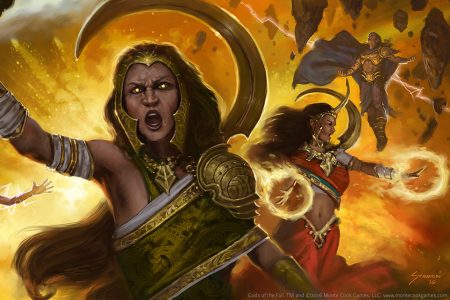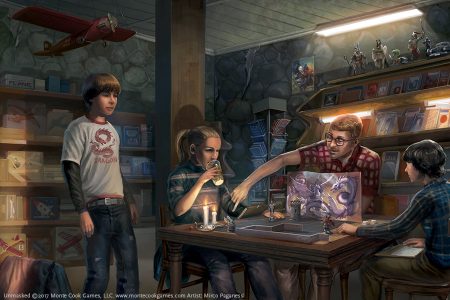 If you’re a GM, you probably put a lot of work into significant nonplayer characters (NPCs) for your campaign. Prominent helpful characters who you expect to appear often (such as mentors for the player characters (PCs)) get well-defined personalities, mannerisms, and interesting descriptions because you know the players will be talking to those characters a lot. But players have a habit of taking a sharp left turn from where you expect them to go and end up talking to all sorts of NPCs that you haven’t given much thought to. And although not every NPC interaction has to be a memorable conversation, being able to create interesting NPC personalities on the fly is a useful GM skill, especially if you don’t want the PCs to be able to tell they’ve gone off the path by encountering a bland NPC.
If you’re a GM, you probably put a lot of work into significant nonplayer characters (NPCs) for your campaign. Prominent helpful characters who you expect to appear often (such as mentors for the player characters (PCs)) get well-defined personalities, mannerisms, and interesting descriptions because you know the players will be talking to those characters a lot. But players have a habit of taking a sharp left turn from where you expect them to go and end up talking to all sorts of NPCs that you haven’t given much thought to. And although not every NPC interaction has to be a memorable conversation, being able to create interesting NPC personalities on the fly is a useful GM skill, especially if you don’t want the PCs to be able to tell they’ve gone off the path by encountering a bland NPC.
Here’s a tip for creating interesting NPC personalities on the fly: think of a character that you know, and have the NPC act like them. You don’t have to be a skilled actor and you don’t have to do an accent. Just filter your words through the lens of a particular person, and let your background knowledge of that person show through in their speech and actions.
If a PC asks a young stable hand what’s going on in the village, the stable hand can be a little whiny about how nothing ever happens here, how much he wants to see things in the big city. If a PC starts a conversation with a passing wizard in a library, she can be stern, prim, wondering out loud what sort of trouble the PC is getting into, and fond of alliteration and enunciation. The player doesn’t need to know that you’re basically channeling a young Luke Skywalker for the stable hand and Professor Minerva McGonagall for the wizard, and if you don’t actually try to imitate their voices, they probably won’t figure it out.
To mix things up a bit more and keep the player from recognizing your source, change some visual aspect of the NPC so it doesn’t match the character you’re channeling—players will be less likely to recognize the Luke-ness of a female dwarf stable hand or the McGonagall-ness of a dark-skinned androgynous wizard. In some campaigns, this can be an extreme change, like a robot stable hand or an alien wizard.
There’s no need to limit yourself to characters from movies and television. People you know in real life can be NPC personality fodder. Try to pick someone your players don’t know—someone you work with, a family member, or someone you knew in college or high school. Anyone you’ve spent a lot of time with, whether you like them or not, is a good candidate, so long as they’re easy to remember. If you need a mid-level worker NPC in a business, think of that clueless boss or co-worker at the restaurant job you had in your teens. If you need a soldier NPC, think of your crotchety ex-military uncle who has a lot of ideas about officers and the good old days. If you need a bartender NPC, think of that person you dated for a while in college who criticized everything you liked.
And just like with channeling a character from a film or show, you don’t have to perfectly emulate someone you know in real life, you’re just using them as inspiration for the NPC’s personality.
Tune in for the next two weeks to get more advice on bringing your NPCs to life!
